83-year-old historian spoke to Miami middle schoolers about racism. Here’s how it went
“Good morning! I have a question for you: What is the greatest country in the world?” asked Marvin Dunn, 83, to an auditorium full of middle schoolers yawning and rubbing their eyes at about 9:30 a.m. Thursday.
“America!” the students at Palmetto Middle School suddenly screamed in unison, awakening.
“The United States of America; that’s right,” he said. “We live in the greatest country in the world, and don’t let anyone tell you anything different. We are a great country. But we have had our problems. It’s history, and it’s history I lived.”
Dunn, a renown historian who specializes in Florida’s Black history, visited the Pinecrest school Thursday to commemorate the start of February, Black History Month. A civics and history teacher, Mayade Ersoff, said she invited him because she wanted her sixth and seventh graders to learn about racism and discrimination from someone who lived through segregation.
Dunn attended despite an increasingly tense environment in schools and universities in Florida fostered by new laws and rules passed by Gov. Ron DeSantis and the state Legislature to control classroom discussions about history and racism. When Dunn last visited the school two years ago, for instance, he walked straight into the classroom. This year, the school required each student to get permission slips signed by their parents to attend a “field trip,” Ersoff said.
“I’m not afraid,” Dunn told the Herald, donning a “Teach the Truth” T-shirt. “This matters.”
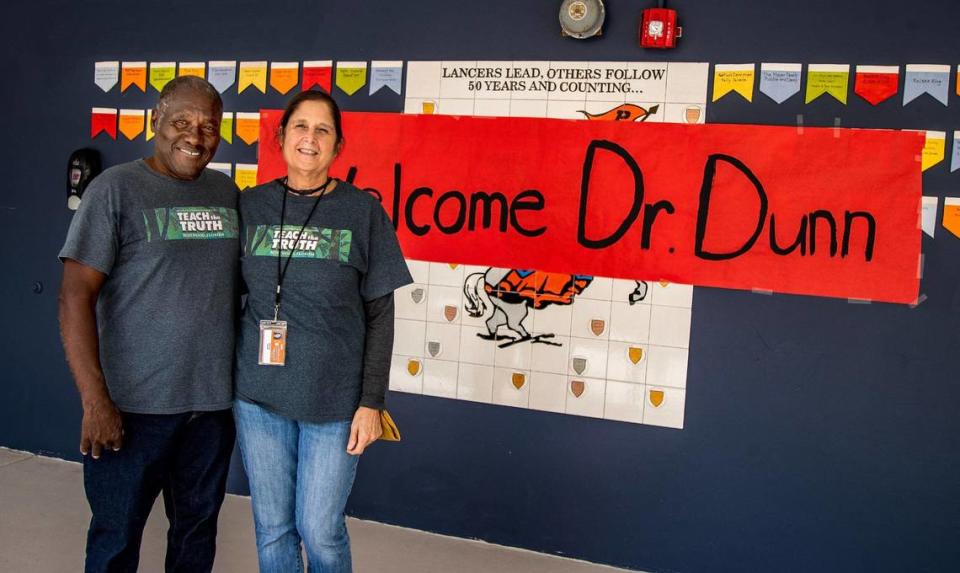
Dunn first told students on Thursday about himself: He was born in 1940 in a town called DeLand, located in central Florida about forty miles northeast of Orlando. His father picked oranges for a living, and his mother was a maid. They were poor.
When he was about seven, his mom took him to the post office one day. As they waited in line, he saw white people cutting them off. He already understood what standing in line and waiting for your turn meant, so after they left, he asked his mom why others got in front of them.
“She said, ‘because we’re colored,’” Dunn recalled. “That’s what they called Black people back in the 1940s.”
As Dunn spoke, some of the kids leaned in to hear him better or tilted their heads in thought.
“How do you think I felt as a 7, 8, 9-year-old growing up in the Jim Crow system?” Dunn said. “That’s what we’re going to talk about today: Jim Crow. What it was and why it died.”
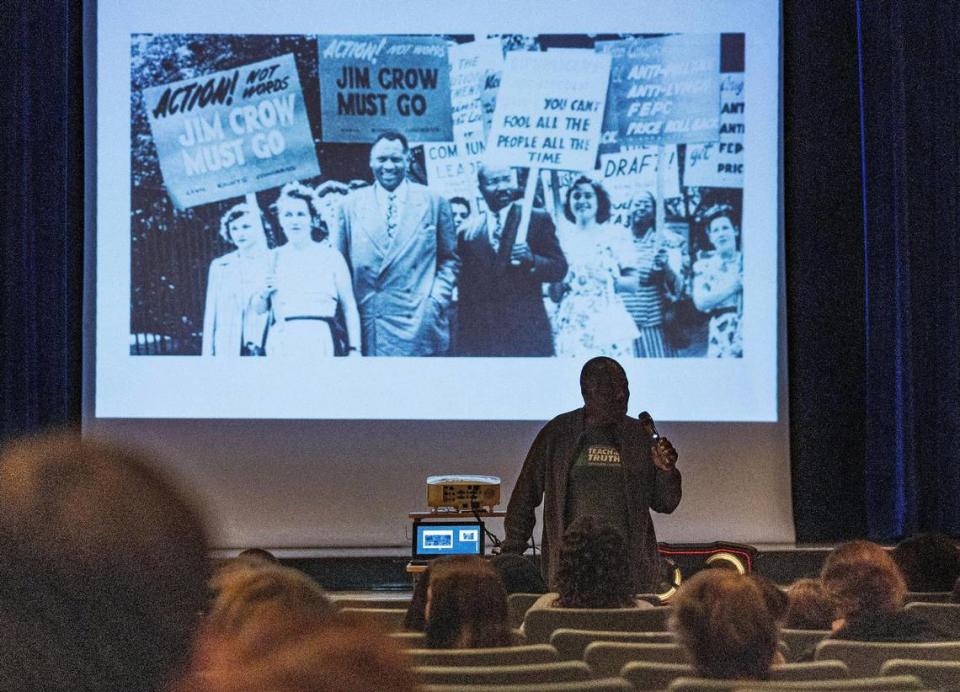
Racism versus discrimination
In a show of hands, Dunn then asked students if they knew what racism was. A bunch of small hands shot up to the ceiling, and a student said: “To think that your race is better than any other.”
“That is correct,” Dunn said. The other kids applauded.
Dunn said anyone can be racist, including Black people, and added that it’s legal to be racist: “You can believe that. Again, this is a free country. It’s a great country.”
Dunn asked next what discrimination was, and another student stood up: “To treat someone differently because of their race.”
“Perfect,” Dunn said, again followed by clapping hands.
“And now what’s important to know is you can’t do that,” he said. “That’s illegal. You can’t treat me differently because I’m Black, and a Black person can’t treat someone white differently because they’re white.”
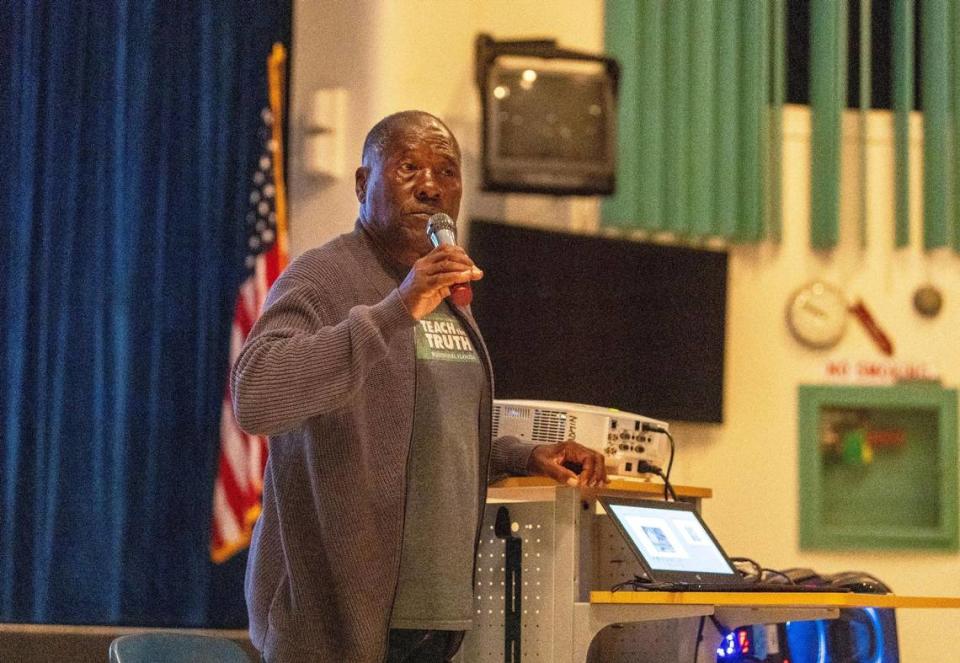
From there, Dunn dove deep into Jim Crow. He explained it wasn’t a person, but a set of policies named after a person: Thomas Dartmouth Rice, an American playwright who performed with his face painted in black and made fun of Black people.
On a projector, Dunn showed students, among other things, a poster that read: “We serve white’s only. No spanish or mexicans” and a sign that read, “Restrooms with an arrow pointing left for “White” and an arrow pointing right for “Colored.”
“I saw that sign many, many, many times,” said Dunn, whose family moved to Miami in 1951.
He said that up until 1927, when the first Black high school opened in South Florida — Booker T. Washington Senior High School in Overtown, Black students could only study up to eighth grade. Dunn himself traveled across town to the white high school, Deland High School, to collect their used textbooks and old science equipment, as the new stuff went exclusively to white schools.
He told them about how Black people had to sit in the back on the bus so they would be far away from white people. But they sat on the first coach of the train, so white people could avoid the smoke coming out of the engine at the front.
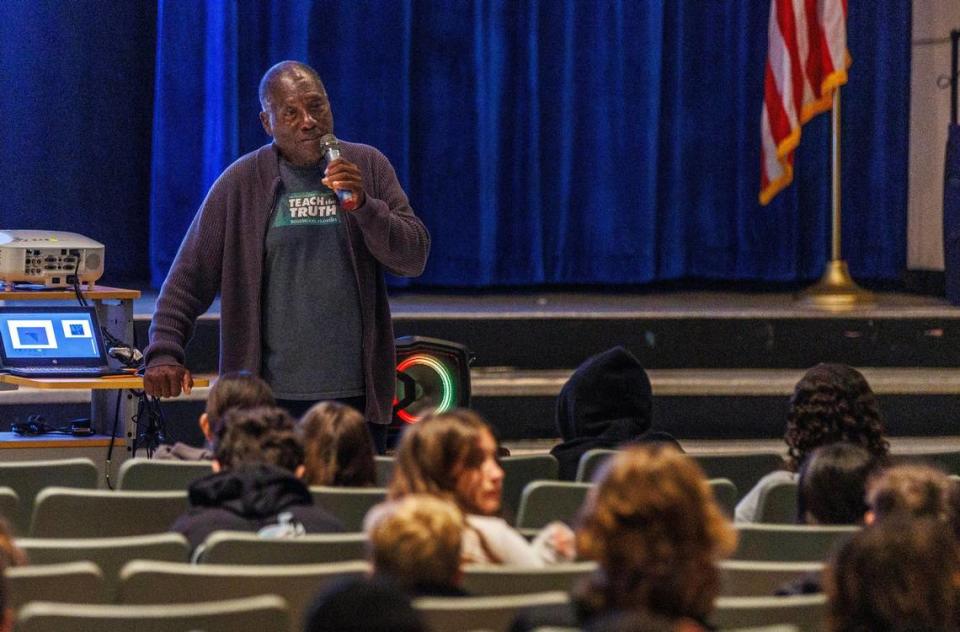
He then recounted how he got kicked off a bus in Georgia once for sitting in a middle row. White passengers complained.
“I won’t use the word they used but you can imagine,” Dunn said. “Get up N-word. You know you don’t belong here, N-word.”
He was moving up north to Atlanta to attend Morehouse College and after the driver asked him to jump out, he waited at a gas station for about three hours for the next bus. When he boarded that one, he sat in the back.
Toward the end of his presentation, Dunn stopped for a beat, then added: “Here I am 83 years old still remembering these stories. Racism causes that type of pain you never forget.”
How has the U.S. changed
Once Dunn wrapped up, he took a flurry of questions from the audience — all sorts of questions ranging from personal details like how many years he served in the Navy to general facts like how long did Jim Crow laws last.
“What moment hurt you the most during segregation?” a boy in the back wanted to know. When the University of Florida denied him admission because he was Black, Dunn said.
“How did you feel during all of this?” a girl questioned. Like he was not as good as white people.
“If you’re Hispanic, are you Black or white?” someone in the front row prompted. Depends, but likely a mix, he said.
They asked him to compare racism in the 1900s versus nowadays, and what the scariest year of his life has been.
READ MORE: He earned top prize for teaching about Black history in Florida, including lynchings
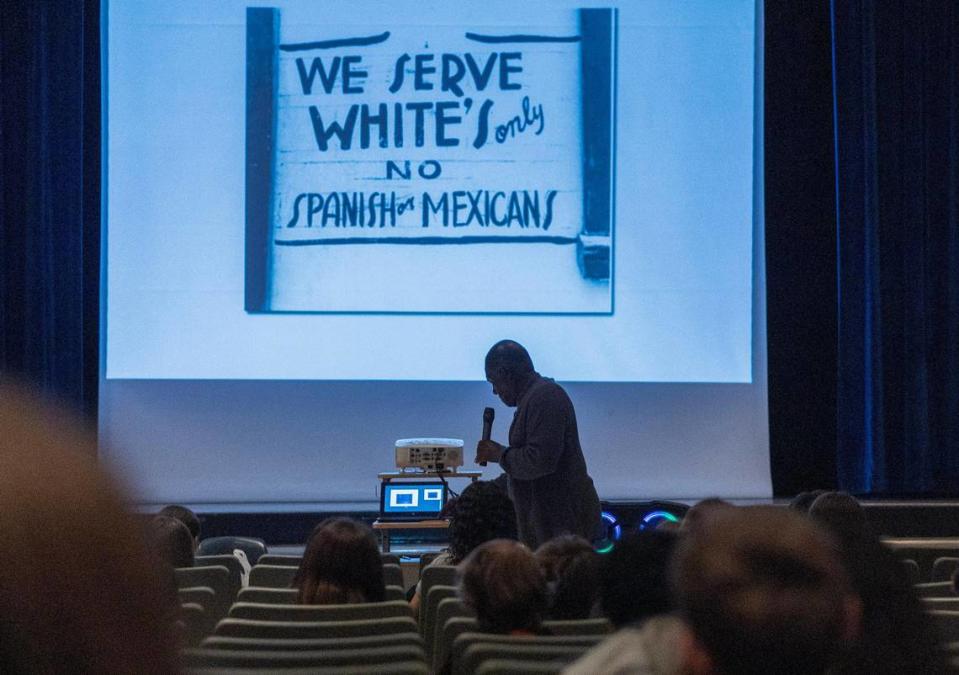
He said the U.S. has made a lot of progress because racism is less prevalent than before, but it’s still present. For instance, he keeps a box of mean letters he gets, especially after he comes out on the newspaper or on TV. And in 2022, a neighbor of his almost ran over one of Dunn’s son with his truck after calling them the N-word. Last year, David Allen Emanuel, 62, was found guilty of six counts of hate crime.
More importantly, most people are not racist these days, but misinformed, he added.
Dunn also told students that the scariest year of his life was last year.
“I’m serious,” he told them inside the auditorium. “I’m afraid we run the risk of race becoming as divisive as it was decades ago. ... And that burden is on you. I’m Dunn, and I’m done. You’re the next generation, and you’re responsible for coming together and giving us a better society, all of you.”
Then a kid asked what advice he would give to people who want to stop discrimination.
“Call it out when you see it,” he said. “You know what it is now. When you hear a racist joke, call it out. When you hear people talking about others like they’re aliens, speak up.”


